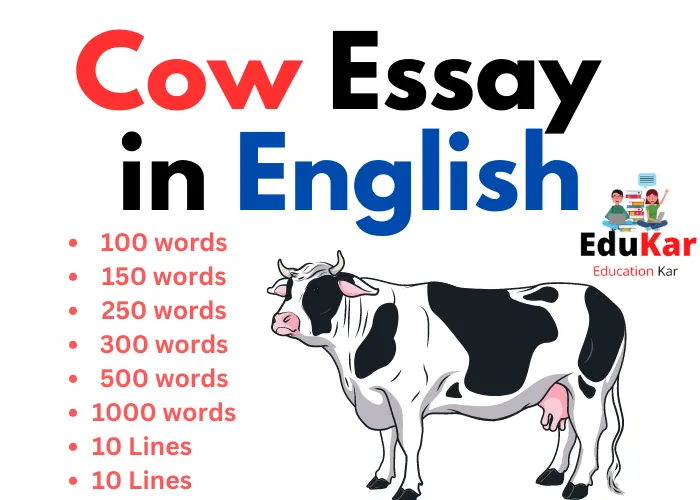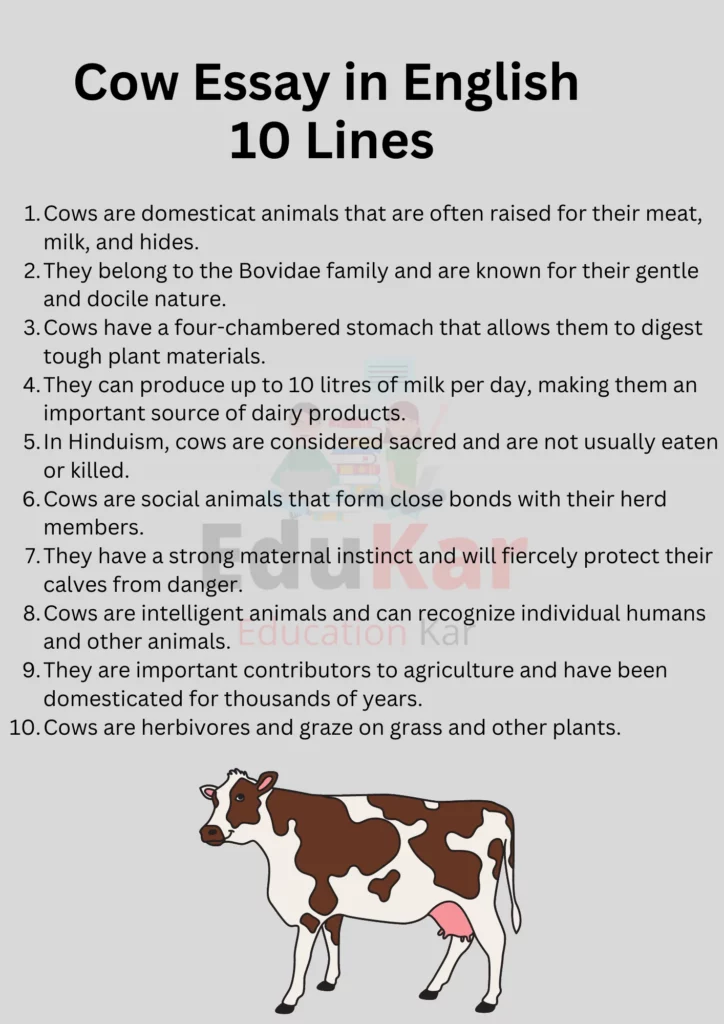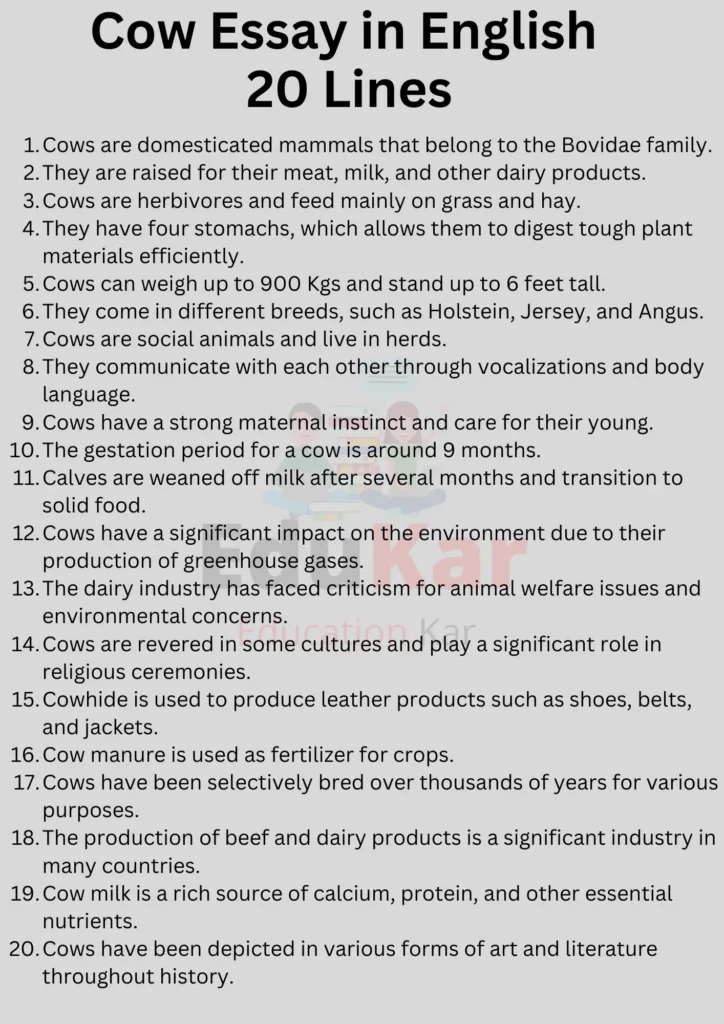This Cow essay in english explores the significance of cows in Indian culture and economy, as well as the challenges they face today. Learn about their importance in Hindu beliefs, their use in various industries, and the initiatives taken by the Indian government to address issues such as illegal slaughtering and plastic ingestion.

Cow Essay in English 100 words
India is home to one of the world’s largest populations of cows, and they hold a significant place in Indian culture and traditions. Cows are considered sacred and are respected by Hindus, who believe that cows are a symbol of wealth, strength, and motherly love.
Apart from their religious significance, cows are also valued for their milk, which is a staple in Indian households. Cow dung and urine are also used for various purposes, such as fuel, fertilizer, and medicinal remedies.
However, the treatment of cows in India has been a subject of debate, with some advocating for better treatment and protection of cows from cruelty and abuse.
Cow Essay in English 150 words
Cows are considered sacred by the Hindu religion and are an integral part of the country’s culture and economy. According to Hindu beliefs, the cow is seen as a symbol of wealth, strength, and motherly love. Therefore, they are often treated with respect and care, even in modern times.
Cows are used for a variety of purposes. They provide milk, which is used in cooking and as a beverage, and cow dung is used as a source of fuel for cooking and heating. Cows are also used for plowing fields and as a means of transportation in rural areas.
Despite their cultural significance, cows in India face several challenges. Many cows roam the streets of cities and towns, and they often eat plastic and other harmful materials, which can cause health problems. Additionally, the increasing demand for beef and leather has led to the illegal slaughtering of cows.
To address these issues, the Indian government has implemented various initiatives, such as setting up cow shelters and promoting the use of biodegradable materials. However, the issue remains complex and continues to be a topic of debate in the country.
Cow Essay in English 250 words
India is a country that is known for its rich cultural heritage and diverse agriculture. One of the most important aspects of agriculture in India is the rearing of cows. Cows are considered sacred animals in the Hindu religion and are an integral part of the culture.
Cows are reared in every part of India, from the rural areas to the cities. They are seen as a symbol of wealth and prosperity and are treated with the utmost respect. The milk that cows produce is an essential part of the Indian diet, and it is used to make a variety of dairy products, including yogurt, butter, and ghee.
In addition to their role in agriculture, cows also play a significant role in Indian mythology and religion. In Hinduism, cows are considered to be the embodiment of the mother goddess and are revered as sacred animals. It is believed that by feeding and taking care of cows, people can earn blessings and good karma.
Despite their importance, cows in India are often mistreated and neglected. Many cows are abandoned on the streets or left to fend for themselves in overcrowded dairies. The Indian government has taken steps to protect cows by passing laws that prohibit the slaughter of cows and provide for their welfare.
In conclusion, cows play an important role in the agriculture, mythology, and religion of India. They are a symbol of wealth and prosperity and are revered by the people. However, the mistreatment and neglect of cows is still a problem in India, and it is important that steps are taken to protect and care for these sacred animals.
Cow Essay in English 300 words
The cow holds a special place in Indian culture and tradition. In Hinduism, it is considered a sacred animal and is worshipped as a symbol of motherhood, fertility, and nurturing. Hindus regard cows as a source of food, clothing, and medicine, and they play a significant role in Indian agriculture. In this essay, we will explore the importance of cows in India.
Cows are a significant source of milk and dairy products in India. Milk is a vital ingredient in many Indian dishes, and it is used to make several dairy products like ghee, butter, curd, and cheese. In addition, milk is a nutritious food that contains essential vitamins and minerals that help in the growth and development of the body. The cow, therefore, plays a vital role in providing nourishment to millions of people in India.
Cows are important for Indian agriculture. They are used as draft animals to plow fields and transport goods, and their dung is used as fertilizer. Cow dung is also used as a fuel source in rural India, and it is burned to provide heat and cooking fuel. Moreover, cow urine is used as a natural pesticide, and it has medicinal properties that help in treating several diseases.
Cows hold significant cultural and religious importance in India. The cow is revered as a symbol of compassion, purity, and selflessness in Hinduism. Many Hindus believe that feeding a cow or taking care of it can earn them good karma and bring them closer to God. Moreover, cows are featured in several Indian festivals and rituals, and they are often adorned with flowers and jewelry.
However, the significance of cows in India has also led to controversy and conflict. The slaughter of cows is a sensitive issue in India, and it has led to violent clashes between communities. Many states in India have banned cow slaughter, and those who violate the law can face severe punishment.
Cow Essay in English 500 words
Introduction
Cows are an integral part of Indian culture and society due to their religious, economic, and ecological significance. In India, cows are considered sacred animals, and they play a crucial role in the country’s economy and environment. While some controversies surround cows in India, their cultural and societal importance remains undeniable.
Religious significance of cows
The religious significance of cows in India is deeply rooted in Hinduism, Jainism, and Buddhism. Hindus consider cows to be holy creatures, and they believe that the cow is the abode of all gods and goddesses. In Jainism, cows are regarded as a symbol of non-violence, and their protection is considered a fundamental moral duty. Similarly, Buddhists consider cows to be symbols of compassion and gentleness. Due to these beliefs, cows are treated with great respect and care in India. Religious ceremonies and rituals involving cows are common, such as the practice of feeding cows on special occasions like weddings, births, and festivals.
Economic significance of cows
The economic significance of cows in India is also considerable. Cow rearing is a significant source of livelihood for millions of households in the country. In addition, cows contribute to the Indian economy through milk production, meat, leather, and other products. Milk is a vital part of the Indian diet, and it is used to make a variety of dairy products like butter, ghee, and paneer. The meat and leather industries also rely heavily on cows, with beef being a significant export commodity. Furthermore, cow dung and urine are widely used as organic fertilizers and insecticides, contributing to sustainable agriculture practices.
Ecological significance of cows
The ecological significance of cows in India is equally important. Cows are essential to maintaining soil fertility and preventing soil erosion. The dung and urine of cows are rich in nutrients and organic matter, which helps improve soil quality and fertility. Cow dung is also a source of fuel and energy for rural households, providing an alternative to fossil fuels. Moreover, cows play a vital role in preserving the biodiversity of Indian ecosystems. Indigenous cow breeds are adapted to local environmental conditions and are an essential part of India’s rich biological heritage.
Controversies surrounding cows
Despite the cultural and economic importance of cows in India, some controversies surround them. Conflicts between religious sentiments and animal rights activism are not uncommon, with some groups opposing the use of cows in dairy and meat industries. Furthermore, cow protection laws and vigilante groups have led to incidents of violence and harassment against individuals suspected of cow slaughter. The beef ban and cow slaughter laws have also faced criticism for their impact on the meat industry and the livelihoods of marginalized communities.
Cow Essay in English 1000 words
Introduction
Cows have a special place in Indian culture and society. They are considered sacred by many Hindus, and their milk and other products are used in religious rituals. Cows are also an important part of the Indian economy, with dairy and leather industries relying heavily on their products. In this essay, we will explore the significance of cows in Indian culture, the efforts to protect them, and the challenges they face.
Significance of Cows in Indian culture
Cows have a significant role in Indian culture, especially in Hinduism, Buddhism, and Jainism. According to Hindu mythology, cows are believed to be the embodiment of the earth goddess and are revered as a symbol of motherhood, purity, and abundance. Cows are also associated with several Hindu deities such as Lord Krishna, who is depicted as a cowherd, and Lord Shiva, who is often seen with a bull.
In Jainism, cows are regarded as non-violent animals, and the killing of cows is considered a grave sin. Buddhists also consider cows as sacred animals and promote compassion towards them.
The sacredness of cows is reflected in the treatment of cows in Indian society. Many Hindus abstain from eating beef and even consider cow slaughter as a punishable offense. Cow products such as milk, ghee, and curd are commonly used in religious rituals and are believed to have purifying qualities.
Cow protection in India
In recent years, cow protection has become a contentious issue in India. The Indian government has enacted several laws to protect cows, including a nationwide ban on cow slaughter. However, the implementation of these laws has been problematic, and cow vigilante groups have taken it upon themselves to enforce these laws. These groups have been accused of using violence and intimidation against those who violate cow protection laws, including Muslims and Dalits.
The actions of cow vigilantes have created a great deal of controversy and have been condemned by many. Several high-profile incidents of violence and lynchings have led to calls for greater regulation of these groups. Some have also called for a re-evaluation of the cow protection laws, arguing that they are based more on religious sentiment than on scientific evidence.
Efforts to protect Cows and promote cow-based industries
Despite the controversies surrounding cow protection, there are also many efforts to promote the well-being of cows and to promote cow-based industries. Many NGOs and animal welfare organizations are working to rescue and rehabilitate stray cows and to provide them with proper care.
The dairy industry is one of the largest industries in India and relies heavily on cow milk. The government has implemented several programs to support the dairy industry, including subsidies for farmers and the establishment of milk cooperatives. The leather industry is also a significant contributor to the Indian economy, with cowhide exports accounting for a significant portion of India’s leather exports.
In addition to these industries, cow dung and urine are also used for various purposes. Cow dung is a valuable source of fuel, and many rural households use it as a cooking fuel. It is also used as a fertilizer and is believed to have medicinal properties. Cow urine is believed to have curative properties and is used in Ayurvedic medicine.
Challenges facing Cows in India
Despite their importance, cows in India face several challenges. One of the most significant challenges is the issue of stray cows. With the increasing urbanization of India, many cows are left to roam the streets, leading to conflicts with motorists and pedestrians. The lack of proper care and attention also leads to health problems for these animals.
Another challenge is the cruelty and neglect that cows face in some parts of India. Many cows are abandoned by their owners and left to fend for themselves. They are often subjected to starvation, abuse, and neglect, leading to a high mortality rate.
Cows hold a special place in Indian culture and society, and their importance is reflected in their treatment and use. While there are efforts to protect cows and promote cow-based industries, there are also challenges that must be addressed. Stray cows, cruelty and neglect, and conflicts with other interests all pose significant challenges to the well-being of cows in India. Ultimately, it is important to find a balance between cow protection and the needs of society, and to promote sustainable and ethical practices that benefit both cows and humans.
Cow Essay in English 10 Lines
- Cows are domesticat animals that are often raised for their meat, milk, and hides.
- They belong to the Bovidae family and are known for their gentle and docile nature.
- Cows have a four-chambered stomach that allows them to digest tough plant materials.
- They can produce up to 10 litres of milk per day, making them an important source of dairy products.
- In Hinduism, cows are considered sacred and are not usually eaten or killed.
- Cows are social animals that form close bonds with their herd members.
- They have a strong maternal instinct and will fiercely protect their calves from danger.
- Cows are intelligent animals and can recognize individual humans and other animals.
- They are important contributors to agriculture and have been domesticated for thousands of years.
- Cows are herbivores and graze on grass and other plants.

Cow Essay in English 20 Lines
- Cows are domesticated mammals that belong to the Bovidae family.
- They are raised for their meat, milk, and other dairy products.
- Cows are herbivores and feed mainly on grass and hay.
- They have four stomachs, which allows them to digest tough plant materials efficiently.
- Cows can weigh up to 900 Kgs and stand up to 6 feet tall.
- They come in different breeds, such as Holstein, Jersey, and Angus.
- Cows are social animals and live in herds.
- They communicate with each other through vocalizations and body language.
- Cows have a strong maternal instinct and care for their young.
- The gestation period for a cow is around 9 months.
- Calves are weaned off milk after several months and transition to solid food.
- Cows have a significant impact on the environment due to their production of greenhouse gases.
- The dairy industry has faced criticism for animal welfare issues and environmental concerns.
- Cows are revered in some cultures and play a significant role in religious ceremonies.
- Cowhide is used to produce leather products such as shoes, belts, and jackets.
- Cow manure is used as fertilizer for crops.
- Cows have been selectively bred over thousands of years for various purposes.
- The production of beef and dairy products is a significant industry in many countries.
- Cow milk is a rich source of calcium, protein, and other essential nutrients.
- Cows have been depicted in various forms of art and literature throughout history.

FAQs
What is the significance of cows in India?
ows are considered sacred in India, and their importance goes beyond their economic value. Cows are seen as a symbol of wealth, strength, and fertility, and are revered by Hindus who make up a majority of the population in India.
How do cows play a role in the Indian economy?
Cows have always been an integral part of the Indian economy. They are used for agriculture, dairy production, and transportation. Cow milk, butter, ghee, and yogurt are all essential items in Indian cuisine, and the dairy industry is a significant contributor to the country’s economy.
What are the laws protecting cows in India?
India has laws in place to protect cows from slaughter and mistreatment. The Indian constitution has provisions for the protection of cows, and several states have enacted laws that prohibit cow slaughter.
How do cows impact the environment ?
Cows have a significant impact on the environment. They are responsible for a large amount of greenhouse gas emissions and contribute to soil degradation. The Indian government has taken steps to promote sustainable livestock practices to minimize the environmental impact of cows.
What is the role of cows in Indian culture and mythology?
Cows have a significant role in Indian culture and mythology. In Hinduism, cows are associated with several deities, including Lord Krishna, who is often depicted as a cowherd. Cows are also considered a symbol of purity and are used in several religious rituals.
How has the relationship between humans and cows in India evolved over time?
The relationship between humans and cows in India has evolved over time. While cows have always been an integral part of Indian society, their importance has changed over the centuries. In ancient times, cows were used primarily for agriculture and transportation. With the rise of the dairy industry, cows have become a significant source of economic wealth and cultural identity.






